
The name for the mystery of God becoming human in Jesus is incarnation. The word incarnation means in-flesh-ment. When we pray the Nicene Creed at weekend Eucharists, we proclaim our faith that Jesus is both the Son of God and the son of the virgin Mary.
In the early fifth century, some people disagreed. A great controversy began in the Church over a small incident. At Mass the Empress Pulcheria usually stepped into the sanctuary to receive communion.
In A.D. 428 a priest named Nestorius became Bishop and Patriarch of Constantinople, where the Empress lived and worshiped. Nestorius refused to give the Empress communion in the sanctuary because she was a woman.
Pulcheria insisted, “Did I not give birth to God?” By this she meant, “Do I not have the same dignity as Mary, the woman who gave birth to God?”
Nestorius taught against calling Mary by the Greek title Theotokos, which means God-bearer. He also thought that the title Mother of God was a total contradiction.
The word mother and the act of giving birth belonged to the material, physical world. God, on the contrary, belonged to the eternal, spiritual world. God could not be born or have a mother, according to Nestorius. He taught that God only appeared human in Jesus.
In A.D. 431, a council of bishops met at Ephesus and decided that Nestorius was wrong. In Jesus, God’s Son had become human. Jesus was truly human and truly God. Mary was the Mother of God.
The Empress Pulcheria and the people of Ephesus processed through the streets, joyfully proclaiming Mary, “Theotokos,” expressing their faith that Mary had indeed given birth to God’s Son, that God had become incarnate in Jesus.

In Sunday’s gospel Elizabeth recognizes that her young kinswoman Mary is a deeply spiritual girl. “Blessed are you among women,” Elizabeth says to Mary. “Blessed is the fruit of your womb; blessed is she who trusts God’s words will be fulfilled.”
In answer Mary prays a song that has stayed on the Top-40 prayer charts for 2,000 years. Sometimes the prayer is called, “Mary’s Song,” sometimes the Magnificat, after its first word in Latin.
Mary’s Song
My life proclaims the greatness of God.
My spirit finds joy in God who saved me.
God has looked upon me
in my lowliness;
all ages to come shall call me blessed.
God who is mighty
has done great things for me.
Holy is God’s name.
Mercy is God’s hand
upon all who fear the Holy One.
Strength is God’s arm.
God has confused the proud
in their inmost thoughts;
God has put down the mighty
from their thrones and raised up the lowly to high places.
The hungry God gives good things.
The rich God sends away empty.
God remembers the promises
to our ancestors Abraham and Sarah.
Luke 1.46-55
